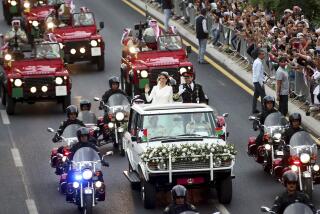Kuwaiti Emir Laid to Rest
KUWAIT CITY — Sheik Jabbar al Ahmed al Sabah, the emir of Kuwait and one of the United States’ closest Mideast allies, was buried in an unmarked grave Sunday in a ceremony attended by thousands of weeping citizens.
The crown prince, Sheik Saad al Abdullah al Sabah -- in his mid-70s and ailing himself -- assumed the throne. But he was expected to leave control of day-to-day government affairs to the prime minister, and no major policy shifts were expected.
Jabbar, 79, was restored to power by American forces after then-Iraqi President Saddam Hussein invaded the small, oil-rich country in 1990. He was one of the few Arab rulers who supported the 2003 U.S.-led invasion of Iraq to topple Hussein. He allowed his country to be used as a launch pad for the American drive to Baghdad.
The new emir, who suffers from a colon condition and must travel abroad periodically for medical treatment, watched from a wheelchair as the body of his distant cousin, wrapped in a Kuwaiti flag, was carried shoulder-high through a crowd of 10,000 mourners and lowered into the grave after a brief Muslim prayer.
Abdul-Rhida Asiri, head of the political science department at Kuwait University, said Prime Minister Sabah al Ahmed al Jabbar al Sabah would become the “de facto ruler” for now, and the ruling family could make further leadership decisions after the mourning period.
The close alliance with the U.S. is not likely to change under Saad. Washington named Kuwait a major non-NATO ally in 2004.
More to Read
Sign up for Essential California
The most important California stories and recommendations in your inbox every morning.
You may occasionally receive promotional content from the Los Angeles Times.










